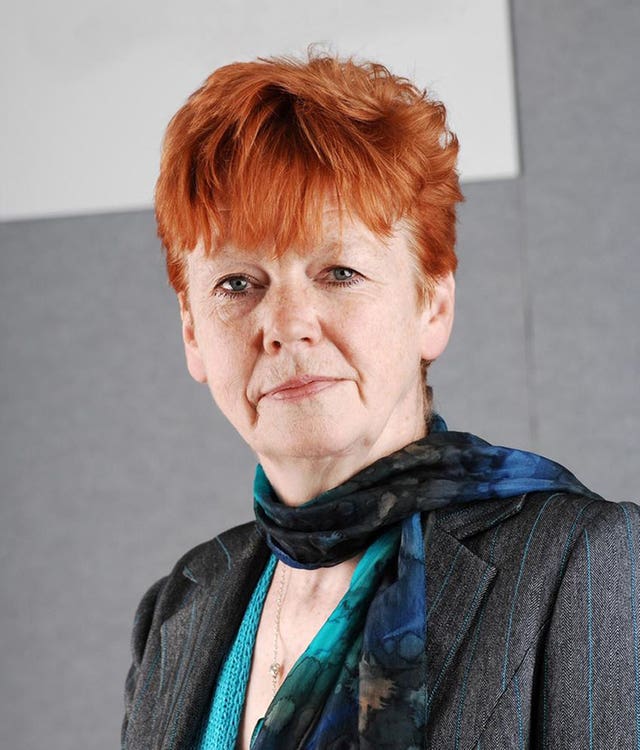
People who are raped face a “culture of disbelief” when trying to obtain justice, the Victims’ Commissioner for England and Wales has said.
Dame Vera Baird QC said a combination of myths surrounding rape and a drop in the number of people prosecutions, despite record volumes of cases being reported to police, meant many victims feel like they were unsupported by the criminal justice system.
Dame Vera told the PA news agency how the lack of convictions was particularly disappointing given the good work of the #MeToo campaign in encouraging victims to come forward.
The former Northumbria police and crime commissioner said: “It is a dreadful message to be going out from the criminal justice system.

“It is true to say that the whole history of prosecuting rape – as anybody who has looked at it from the victims’ point of view in the last few years would say – is there is a culture of disbelief.
“It’s myths and stereotypes about the way women behave, gender relations and so on.”
But she praised the way successful campaigns have given many victims the courage to speak out about their ordeals and report the matter to police.
She said: “I think #MeToo has played a role – as have the prosecutions of Rolf Harris, Stuart Hall, Max Clifford – that was very telling.
“That has made people realise that no matter who they are and who you are, the criminal justice system does want you to tell them about it and will tackle it.
“This has played a big role in people complaining.
“The obvious concern is this is not carrying through in convictions.”

The annual Violence Against Women and Girls report from the Crown Prosecution Service, published in September, showed there were just 1,925 convictions for rape or an alternative lesser offence during the financial year 2018-19, down from 2,635 in the previous 12 months – a drop of 26.9%.
This was despite the number of rape claims dealt with annually by police in England and Wales rising from 35,847 to 57,882 during the last four years.
It means around 3.3% of all reported rapes end in a conviction.
Figures also showed that the charge rate for rape, essentially the decision to press ahead with a prosecution, dropped from 64.3% in 2014-15 to 48.2% this year.
Dame Vera said programmes such as Football Onside, a bystander intervention project launched by the University of Exeter in collaboration with local football clubs to “challenge a toxic locker-room culture” of unacceptable behaviour and language towards women, were crucial in raising awareness and affecting change.
She said some attitudes towards sexist language now are similar to those around drink-driving in the 1970s.
She said: “I remember drunk-driving wasn’t badly regarded.
“If some middle class person got caught driving back from the pub, if they had too much, the attitude was: ‘Why aren’t police catching criminals instead of interfering with me?’
“Good social awareness, good awareness raising campaigns from Government, have changed that entirely.
“Now, if I saw you the worse for drink and get your car keys out I would probably say: ‘hang on a minute’ and take them off you, that’s what most people would do because you know it can kill.
“It is about changing social attitudes, and it is possible to change them.”
Dame Vera was a successful barrister, being made a QC in 2000, before she became Labour MP for Redcar in 2001, eventually becoming solicitor-general in Gordon Brown’s government.
She took on her current role in June 2019.


Why are you making commenting on The National only available to subscribers?
We know there are thousands of National readers who want to debate, argue and go back and forth in the comments section of our stories. We’ve got the most informed readers in Scotland, asking each other the big questions about the future of our country.
Unfortunately, though, these important debates are being spoiled by a vocal minority of trolls who aren’t really interested in the issues, try to derail the conversations, register under fake names, and post vile abuse.
So that’s why we’ve decided to make the ability to comment only available to our paying subscribers. That way, all the trolls who post abuse on our website will have to pay if they want to join the debate – and risk a permanent ban from the account that they subscribe with.
The conversation will go back to what it should be about – people who care passionately about the issues, but disagree constructively on what we should do about them. Let’s get that debate started!
Callum Baird, Editor of The National
Comments: Our rules
We want our comments to be a lively and valuable part of our community - a place where readers can debate and engage with the most important local issues. The ability to comment on our stories is a privilege, not a right, however, and that privilege may be withdrawn if it is abused or misused.
Please report any comments that break our rules.
Read the rules hereLast Updated:
Report this comment Cancel